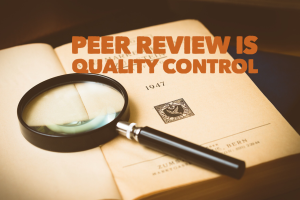Research Forms, Functions, and Skills
4 The Peer Review Process
The peer review process is central to research writing. Research projects must undergo peer review before publication. The process requires a review of the project draft by a scholar knowledgeable in the discipline or field. The peer review is conducted and feedback is provided to the author. The author revises the work based on the feedback, submits it for additional review, and the process continues until the project is publication-ready.
The peer review process leads to the acceptance of a research project within the discipline. Essentially, those knowledgeable in the discipline provide approval of the research process and publication. This approval gives the research work credibility and validation as belonging among other published education research literature. Peer reviewers essentially endorse the work, so their reputation is at stake. Reviewers provide feedback to communicate where the work needs revision to be “endorsement worthy.” Researchers respect the process of peer review knowing that their work is legitimized and endorsed by experts in the discipline.
One of the most difficult activities in the peer review process is receiving feedback. Novice researchers often find the feedback harsh and difficult to accept. This is a very common phenomenon, but understanding the role feedback plays in the process can lessen the impact. The feedback provided is intended to focus the author on issues, errors, and how to improve the writing of the research document. Similar to physical therapy, exercises needed to improve a physical malady are rarely enjoyable but are a much needed part of the healing process.
Many researchers have difficulty seeing their writing objectively. The ability of a reviewer to view a work objectively and provide feedback is a valuable part of the peer review process. Think of the process this way, the researcher does not have to write a perfect draft the first time. There is freedom in writing your thoughts without worrying about perfection. This process allows the writer to draft, knowing the reviewer will provide ways to improve the work. However, this does not mean a reviewer will write your document, only facilitate you in improving the writing. Embracing the feedback provided by reviewers is a key skill needed for successful research writing.

Graduate research projects usually have one to three reviewers providing feedback to the student. Literature reviews and thesis projects tend to have one reviewer, which is the instructor for the course. Dissertations generally have three reviewers, known as the dissertation committee. In some institutions, the dissertation committee has five members. For all types of research projects, the reviewers provide essential feedback needed by the author to revise the work appropriately to meet discipline and institutional standards.

